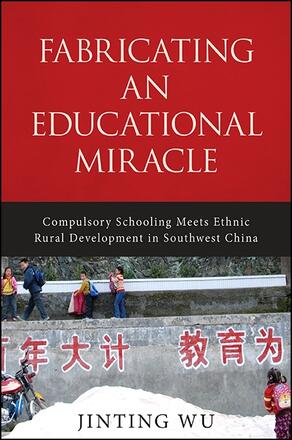
Fabricating an Educational Miracle
Compulsory Schooling Meets Ethnic Rural Development in Southwest China
Alternative formats available from:
Illustrates the changing significance of what it means to be educated, rural, and ethnic in Southwest China.
Description
Winner of the 2017 American Educational Research Association's Division B Outstanding Book Recognition Award
Winner of the 2017 Society of Professors of Education Outstanding Book Award
In today's China, education is translated into both acute social desires and profound disenchantment. Shanghai's stellar performance in the recent Program for International Student Assessment paints a celebratory image of educational success yet tells only a partial story. For many in rural China who are schooled yet prepared only for factory sweatshops, education remains an elusive ideal and offers a hollowed promise of social mobility. Fabricating an Educational Miracle laces together complex accounts of how compulsory education produces dilemmas and possibilities in village schools in Southwest China. Drawing from interviews, participant observations, oral history, and archival research in a Miao and a Dong village-town in Qiandongnan Prefecture, Guizhou Province, this book examines the manifold and contradictory agendas that have captured rural ethnic schooling at a crossroads.
Jinting Wu is Assistant Professor of Education Policy at the University of Macau.
Reviews
"This trenchant but nuanced ethnography offers a searing account of a suffocating snarl of scientism, audit culture, authoritarian pedagogy, and underhand dealings—a bureaucratic jungle that few individuals successfully navigate, and in which most instead submit to the banal disfigurement of their cultural traditions for the benefit of well-heeled tourists or to the indignities of migrant labor in inhospitable cities. Even those few who find an open door hesitate, fearful that the lure of apparent opportunity might trap them and their families in an ever-accelerating downward spiral. Wu's deeply affecting account, leavened and enriched by a wickedly ironic eye for the revelations to be extracted from the tiniest detail, illuminates life choices and chances in contexts national, local, and personal. It represents the ethnography of knowledge and education at its compelling best. " — Michael Herzfeld, Harvard University
"Jinting Wu presents a richly contextualized picture of education in contemporary rural China with a depth of knowledge and a command of ethnographic methods and appropriate theory that expands the picture beyond the confines of her research site and time. She weaves the many details together with a skill that allows the reader to understand their larger relevance and to not become overwhelmed. At the center of her 'levels of analysis' is the dilemma that rural youth face as they struggle to decide whether or not to seek more education beyond what is compulsory. As Wu demonstrates, such a decision is not entirely—if at all—a decision. " — John G. Richardson, Western Washington University
"Theoretically sophisticated, analytically nuanced, empirically vivid, Fabricating an Educational Miracle could be the finest ethnography of education since Philip Jackson's 1968 Life in Classrooms established the genre. Curriculum reform is no abstraction here: we become intimate with its unintended cultural and economic consequences as these are lived by actually existing individuals inhabiting a temporally heterogeneous now. Wu's accomplishment is exceptional; it is profound. " — William F. Pinar, University of British Columbia